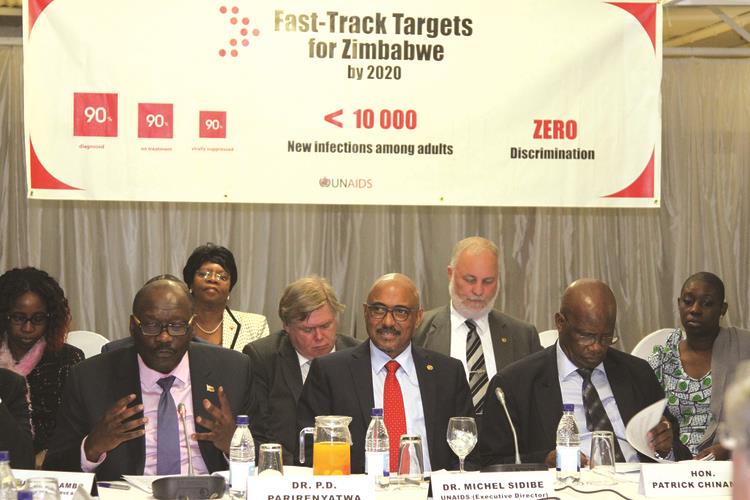
The Sunday Mail


Minister of Health and Child Care Dr David Parirenyatwa (left) stresses a point while UNAIDS Executive Director Dr Michael Sidibe (centre) and Finance and Economic Development Minister Patrick Chinamasa follow proceedings during a joint press conference
Ish Mafundikwa
The findings of the Strategic Timing of Anti-Retroviral Treatment (START) study started in March 2011 were announced on May 27th and they showed that people living with HIV have a considerably lower risk of developing AIDS or other serious illnesses if they start taking antiretroviral treatment (ART) sooner instead of waiting until their CD4 cell count drops below 350 cells/mm3.
The randomised clinical trial was conducted by the International Network for Strategic Initiatives in Global HIV Trials (INSIGHT) at 215 sites in 35 countries. It was expected to end in December 2016, but an interim review of data by the study’s Independent Data and Safety Monitoring Board recommended that results be released early. START was funded by the United States’ National Institutes of Health together with health research agencies from a number of other countries.
The NIH commented in a press release announcing the results: “Together with data from previous studies showing that antiretroviral treatment reduced the risk of HIV transmission to uninfected sexual partners, these findings support offering treatment to everyone with HIV.”
At the time the results were announced, the Joint United Nations Programme on HIV and AIDS, or UNAIDS, the main advocate for accelerated, comprehensive and coordinated global action on the AIDS epidemic welcomed the results of the clinical trial.
“Every person living with HIV should have immediate access to life-saving antiretroviral therapy,” said Mr Michel Sidibé, UNAIDS Executive Director.
“Delaying access to HIV treatment under any pretext is denying the right to health.”
Mr Sidibé was in Zimbabwe earlier this month. During his visit he held a joint press conference with the Ministers of Health and Child Care Dr David Parirenyatwa and Finance and Economic Development, Mr Patrick Chinamasa.
He explained why early treatment is important.
“Science is showing us clearly that you reduce the transmission of HIV by 96 percent when you put people on treatment early. In the developed world they don’t wait anymore because they know that firstly you reduce transmission so you control the epidemic, secondly the infected person will live a healthy life and will not have diseases such as tuberculosis or other opportunistic diseases which will be very costly for the health system.”
The UNAIDS Executive Director, a native of Mali, however conceded that access to treatment in developing countries is still hampered by insufficient resources. He gave the example of Zimbabwe where only 60 percent of those living with HIV are on treatment.
“So our effort is not just to advocate but to work with drug companies to make sure that they reduce drug prices further.”
He however added that depending on imports is unsustainable for Africa, where the majority of people with HIV worldwide are located.
“We need to make sure that our continent understands that local production is key
“If you do not produce your own medicines you will not be able to cover your whole population and if you do not treat people they will continue to infect others.”
But what do the START findings mean for Zimbabwe? Acting director of the Ministry of Health and Child Care’s AIDS and Tuberculosis Unit, Dr Tsitsi Mutasa-Apollo says the ministry has taken note of the START findings.
She added that the Government’s technical experts are reviewing the results with the view to inform its antiretroviral therapy policies. Currently national ART guidelines recommend starting patients on treatment at a CD4 cell count of 500.
“We are not waiting for patients to get to a low CD4 count of 350. We also treat all HIV-infected children under five; all HIV-infected breast- feeding and pregnant women immediately after adequate counselling regardless of CD4 count or clinical presentation. Other groups of patients that also start treatment immediately include HIV/TB co-infected individuals, those co-infected with HIV and Hepatitis B infections and the HIV-infected partner in serodiscordant relationships (relationships where one partner is negative).”
Dr Mutasa-Apollo echoed Mr Sidibé’s call for serious advocacy for a reduction in the global pricing for ARV medicines in anticipation of an increased need for treatment.
As of the end of 2013, 618 980 of Zimbabwe’s estimated 1,4 million people living with HIV were on anti-retroviral therapy. This translated to 62,7 percent of those eligible under existing guidelines and 51,4 percent of total population of those with HIV. New initiations on antiretroviral therapy have been running at more than 10,000 per month, with the total on ART now over 800,000.
Therefore while the START results may result in a serious rethink of when to start HIV people on ARTs, it might be a while before countries with resource constraints, Zimbabwe included, are in a position to fully take up its promise.
Zimbabwe currently picks up only 15 percent of the 360 million dollars spent in the country on AIDS from public domestic and international sources.
“START has changed the treatment paradigm,” said Mr Michael Bartos, UNAIDS Country Director for Zimbabwe. “Instead of waiting until people become eligible, the mantra should be no one with HIV turned away.”
Meeting this new AIDS response challenge will require creative thinking, more efficient models of service delivery, as well as more resource mobilisation from a wider range of partners.
The writer is Consultant Communication Advisor for UNAIDS Zimbabwe



